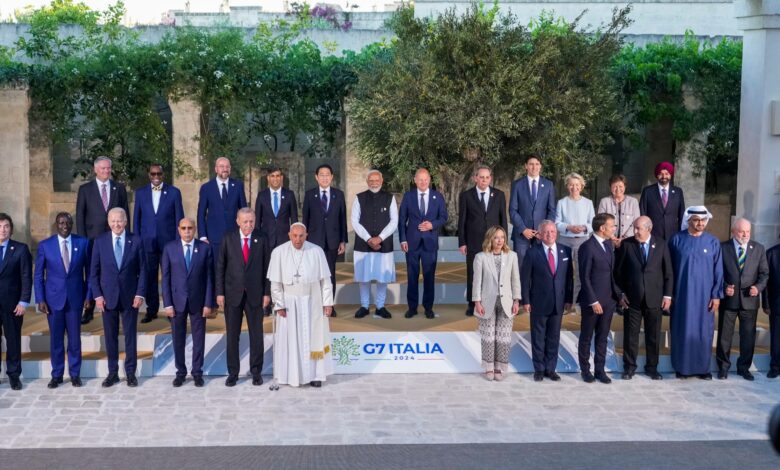G7 AIHiroSawa NikkeiAsia: A Pioneering Moment in Global AI Leadership

G7 AIHiroSawa NikkeiAsia
(G7 AIHiroSawa NikkeiAsia)The G7 summit is a globally significant event where world leaders gather to discuss pressing issues related to the global economy, security, and international relations. In recent years, the summit has increasingly turned its attention to technological advancements, particularly artificial intelligence (AI), and their far-reaching impacts. The 2024 G7 summit prominently featured discussions on AI, marking a pivotal moment for technological governance on a global scale. Central to these discussions was Hirosawa, a leading AI visionary whose innovative contributions have been recognized by major publications, including Nikkei Asia. In this article, we delve into the significance of G7 AIHiroSawa NikkeiAsia, exploring how AI is shaping global leadership, governance, and the media landscape.
The G7 Summit: Bridging Technology and Governance
The Group of Seven (G7) consists of some of the world’s most advanced economies: Canada, France, Germany, Italy, Japan, the United Kingdom, and the United States. Traditionally, the G7 has focused on economic policy and international security. However, in the face of rapid technological changes, the G7 agenda has evolved to address the transformative potential and challenges posed by emerging technologies such as AI.
The 2024 G7 summit was heavily focused on AI, reflecting the growing recognition that AI is not just a tool for innovation but a force that can reshape entire economies, industries, and societies. Discussions revolved around the potential benefits of AI, such as enhancing productivity, healthcare, and education, but also the associated risks, including ethical dilemmas, job displacement, and security threats. The G7 leaders acknowledged the need for international collaboration to ensure that AI’s development aligns with global values and benefits humanity as a whole.
Hirosawa: A Visionary in AI Innovation
At the center of the AI discussions at the G7 summit was Hirosawa, an influential AI expert and innovator whose work has garnered widespread recognition. Hirosawa’s AI technologies have made significant impacts across various sectors, including healthcare, finance, and manufacturing. His vision for AI is not just about technological advancement but about creating systems that serve humanity’s best interests.
Hirosawa’s contributions to AI were highlighted during the summit as examples of how AI can be leveraged to solve complex global challenges. His AI-driven healthcare solutions, for instance, have shown great promise in predicting diseases, improving patient care, and reducing healthcare costs. In the manufacturing sector, Hirosawa’s AI innovations have enhanced efficiency, reduced waste, and created more sustainable production processes.
What sets Hirosawa apart is his commitment to ethical AI. He believes that AI should augment human capabilities rather than replace them. His approach emphasizes transparency, fairness, and accountability in AI systems, principles that are increasingly important as AI becomes more integrated into daily life. Hirosawa’s stance aligns with the broader goals of the G7, which seeks to promote responsible AI development that reflects shared values and ethical standards.
Nikkei Asia: Shaping the Discourse on AI
Nikkei Asia is a leading business and financial publication that has been at the forefront of covering technological advancements, particularly AI, and their implications for the Asia-Pacific region and the world at large. The publication has provided in-depth analyses of AI’s impact on various industries and economies, with a particular focus on how AI is reshaping the global economic landscape.
In its coverage of the G7 summit, Nikkei Asia emphasized the importance of AI in the discussions and highlighted the role of Hirosawa as a key figure in the AI revolution. The publication explored the economic potential of AI, noting that it could add trillions of dollars to the global economy in the coming years. However, Nikkei Asia also addressed the challenges associated with AI, such as the potential for job displacement and the need for regulatory frameworks that ensure AI is developed and used ethically.
Nikkei Asia’s reporting on G7 AIHiroSawa has underscored the significance of AI as a strategic tool for global influence. Countries that lead in AI development are better positioned to shape the future of industries and economies. This geopolitical dimension of AI was a key theme at the G7 summit, where leaders discussed the need for international cooperation to ensure that AI serves the global good rather than exacerbating inequalities or conflicts.
Ethical AI: A Focus at the G7 Summit
One of the central themes of the 2024 G7 summit was the ethical implications of AI. As AI technologies become more autonomous and influential, questions of accountability, transparency, and fairness have become increasingly urgent. The G7 leaders recognized the need for global standards and regulations to guide the development and deployment of AI.
Hirosawa’s contributions to the ethical AI debate were particularly significant. He has long been an advocate for AI that enhances human abilities rather than replaces them. At the G7 summit, Hirosawa emphasized the importance of collaboration between AI developers, policymakers, and ethicists to create AI systems that align with societal values and promote the common good.
This focus on ethical AI is not only a reflection of Hirosawa’s personal philosophy but also of Japan’s broader approach to AI development. As Nikkei Asia has reported, Japan has been a leader in promoting AI ethics, emphasizing the need for AI policies that reflect harmony, respect, and human dignity. Japan’s leadership in this area has influenced the G7’s approach to AI, encouraging other member countries to adopt similar ethical frameworks.
AI and the Global Economy: Opportunities and Risks
The economic implications of AI were another major focus of the G7 summit. AI has the potential to drive significant economic growth by increasing productivity, creating new industries, and improving decision-making processes across sectors. However, the benefits of AI are not without risks, and the technology presents challenges that need to be addressed.
Nikkei Asia’s coverage of G7 AIHiroSawa highlighted both the opportunities and the risks associated with AI in the global economy. On the one hand, AI has the potential to revolutionize industries such as finance, healthcare, and retail. For example, AI-driven financial systems can automate trading and enhance risk management, while AI-powered recommendation systems in retail can improve customer experiences and drive sales.
On the other hand, AI also poses risks to jobs and industries. As AI systems become more capable of performing tasks that were previously done by humans, there is growing concern about job displacement, particularly in sectors that rely on routine tasks. Nikkei Asia has reported on the need for upskilling and reskilling programs to help workers adapt to the changing job market. The publication has also emphasized the importance of government policies that support workers during the transition to an AI-driven economy.
The G7 summit recognized these challenges and called for a coordinated approach to AI development. Leaders emphasized the need for policies that promote innovation while also addressing the social and economic impacts of AI. This includes investing in education and training programs, as well as developing safety nets for workers who are affected by AI-driven changes.
Geopolitics and AI: A New Frontier
AI is not just an economic and ethical issue; it is also a geopolitical one. As countries race to develop advanced AI technologies, there is growing concern about the potential for AI to be used as a tool for economic and military influence. The G7 summit underscored the need for international cooperation to prevent AI from becoming a source of conflict.
Hirosawa’s work in AI has positioned Japan as a key player in the global AI race. His technologies have been adopted by various industries and governments, enhancing Japan’s influence on the international stage. However, with this influence comes responsibility. As Nikkei Asia has pointed out, Japan must navigate the delicate balance of promoting its AI technologies while ensuring they are not used for harmful purposes.
The G7 summit concluded with a call for stronger collaboration between member countries on AI development and regulation. Leaders recognized that AI is a global issue that requires coordinated efforts to ensure that AI serves the common good. This call for collaboration reflects the broader goals of G7 AIHiroSawa NikkeiAsia, which emphasizes the importance of ethical and responsible AI development.
The Future of AI: Global Leadership and Innovation
As we look to the future, it is clear that AI will continue to play a central role in shaping global industries, economies, and societies. The discussions at the G7 summit, as highlighted by Nikkei Asia, reflect the growing importance of AI in global governance. Leaders recognize that AI has the potential to solve some of the world’s most pressing challenges, but only if it is developed and deployed responsibly.
Hirosawa’s contributions to AI will undoubtedly continue to influence the field, as his technologies are adopted by more industries and countries. His focus on ethical AI sets a standard for others to follow, ensuring that AI remains a force for good.
For businesses, the message is clear: AI is no longer a luxury but a necessity. Companies that fail to adopt AI risk being left behind in an increasingly competitive global market. At the same time, they must ensure that their AI initiatives are aligned with ethical standards, as public scrutiny of AI practices intensifies.
Nikkei Asia will continue to be a leading source of information and analysis on AI developments, particularly in the Asia-Pacific region. As AI technologies evolve, the publication will provide valuable insights into how these advancements are shaping the future of business and society.
Conclusion
The discussions around AI at the G7 summit, particularly those focused on the contributions of Hirosawa, underscore the importance of responsible AI development on a global scale. As highlighted by Nikkei Asia, the intersection of AI innovation, ethical considerations, and geopolitical dynamics will define the future of AI leadership. G7 AIHiroSawa NikkeiAsia symbolizes this convergence, offering a roadmap for navigating the complexities of AI in the modern world.
you may also read choicegazette.





